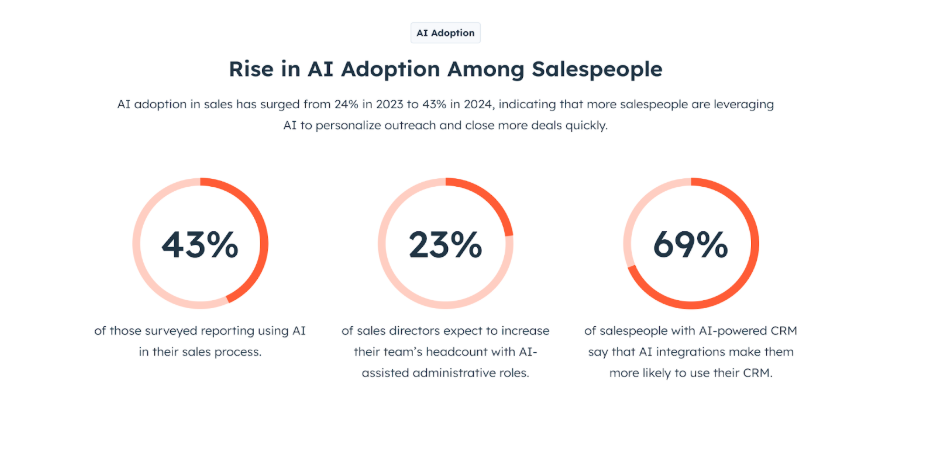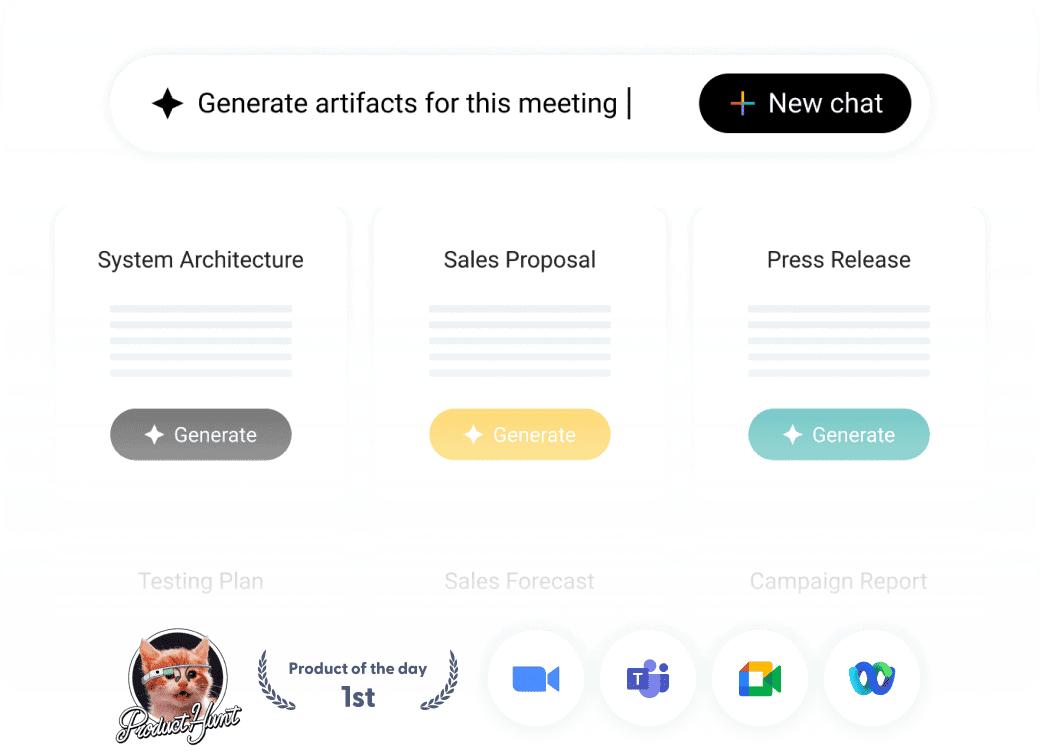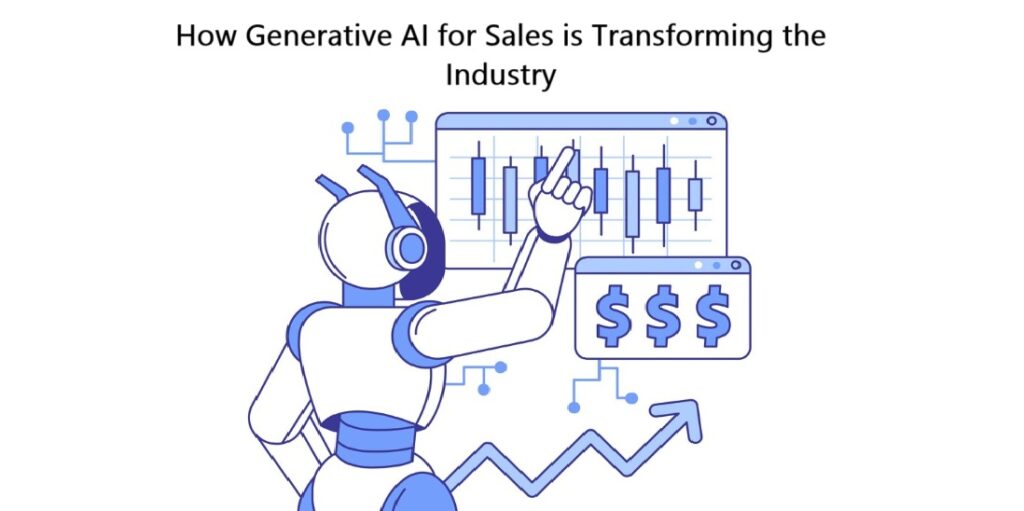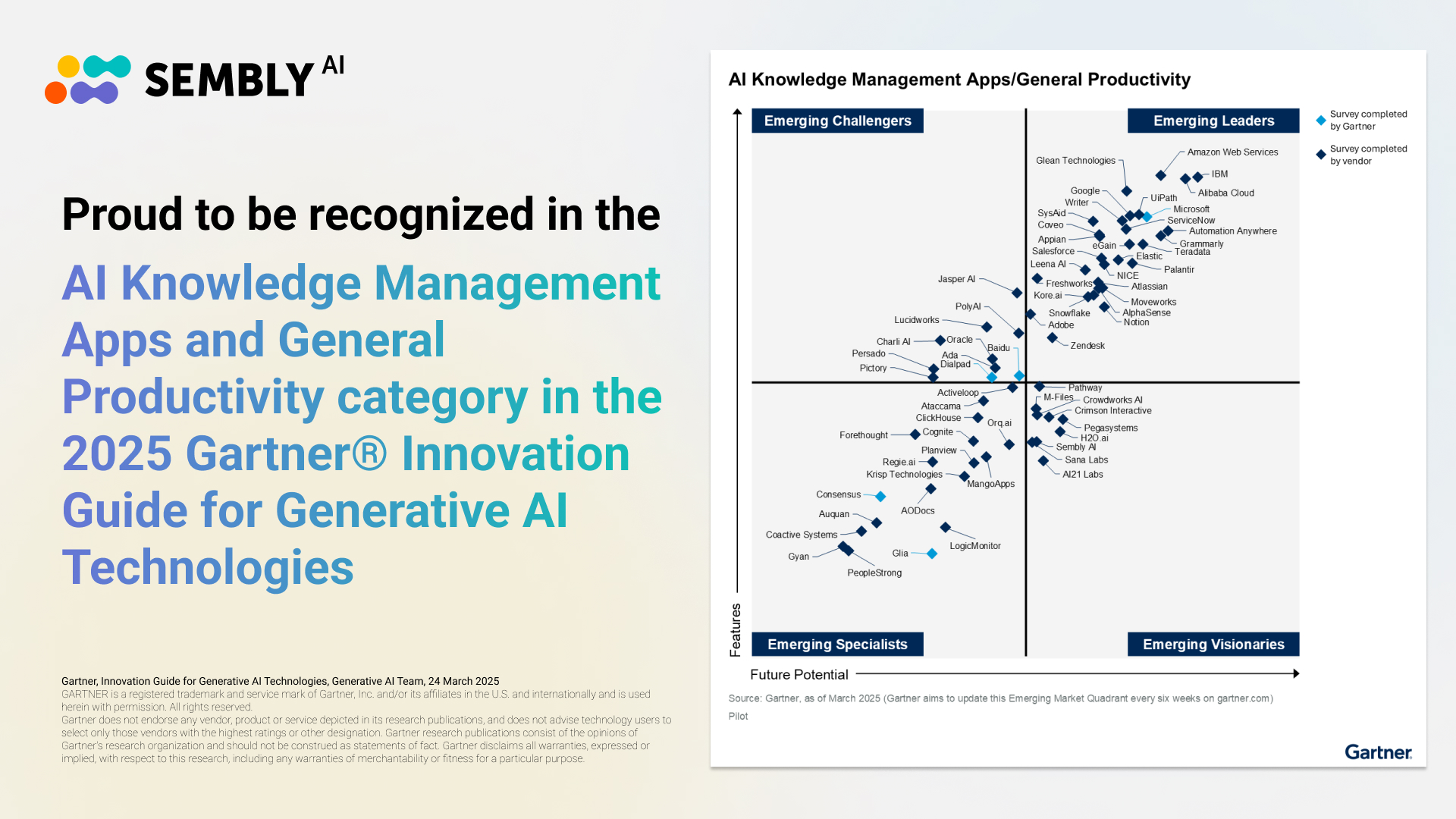Table of Contents
ToggleIt seems like everyone is talking about the benefits of Generative AI nowadays. But how can it help in sales and marketing exactly? With its ability to analyze vast amounts of data, generate insights, prepare personalized outreach messages, and automate time-consuming tasks, generative AI is changing the future of sales strategies.
Let’s see how this technology is transforming the sales sphere, its practical use cases, challenges, and future potential.
The Role of Generative AI in Sales for Organizational Growth
More and more sales professionals are using generative AI in their work. In fact, the adoption of artificial intelligence in sales has grown drastically from 24% to 43% in just a year, according to HubSpot. It is no surprise since this technology improves various aspects of the sales process, from lead generation and customer interactions to sales forecasting and market analysis which help meet customer demands and achieve growth. Let’s see how exactly generative AI can do that.

Image source: HubSpot
Automating Repetitive Tasks
Sales teams spend a lot of time on crucial but time-consuming routine tasks like entering data, scheduling meetings, and sending follow-up emails. That’s where AI comes in. It can handle these tasks easily by doing them automatically which will noticeably free up sales professionals.
Instead, they can focus on more high-value activities that require a human touch, like building relationships with potential customers and making deals with them.
Supporting Sales Managers with Analytics
With AI tools, sales leaders can analyze a lot of data at once to see the performance of their team, sales trends, and customer preferences. This information helps them make the right decisions based on real-time data and come up with strategies to improve sales. Besides that, AI can spot patterns that people might miss which helps managers make plans that fit their company’s needs and drive growth.
Tools like Sembly and its powerful add-on Semblian 2.0, make it even easier to generate actionable insights from meetings. Semblian 2.0 for sales managers can generate a comprehensive Sales Activity Plan that summarizes key activities, targets, and timelines to keep their team focused and aligned with business goals. With automated follow-up emails, sales teams can guarantee timely communication with clients which makes relationships stronger and therefore keeps sales moving forward. Account executives can create onboarding documents to help customers transition smoothly and create contract summaries for quick approval. Business development specialists can create Sales Pipeline Reports to get a clear view of ongoing deals and automate Sales Proposals to offer custom solutions quickly. By making these tasks easier, Semblian 2.0 lets sales teams focus on selling, work more efficiently, and get a bigger revenue.

Enhancing Lead Management
Generative AI improves the lead qualification process by scoring leads based on predictive analytics. This way teams can focus their sales efforts on higher-value activities which results in higher conversion rates and better sales effectiveness.
Personalizing Customer Interactions
AI helps sales teams understand their customers better by analyzing their past purchases, preferences, and their behavior online. This information is essential for sales reps to customize their sales pitch and suggest products that customers will be more likely to want to buy. This in turn increases the chances of making a sale and boosts revenue.
In fact, 33% of sales teams using AI reported a significant increase in revenue, compared to just 20% of teams that did not use AI, according to the Salesforce report.

Image source: https://www.salesforce.com/
Improving Forecast Accuracy
Without accurate sales forecasting, it is impossible to set realistic goals and plan resources effectively. With the help of generative AI that uses historical data, market trends, and even external factors like economic indicators, teams can have highly accurate sales predictions. These forecasts help businesses predict demand for a product, use resources efficiently, and avoid overstocking or understocking.
The Path Forward for Generative AI in Sales
As AI gets better, it will play a bigger and bigger part in sales and marketing. Companies that use AI early will have an advantage over their competitors because AI can make sales operations run more smoothly, make customers happier, and boost revenue.
Addressing the Challenges of Generative AI Integration
AI has many advantages, but it also comes with challenges like data privacy concerns, ethical considerations, and relying too much on sales automation. Businesses need to find a balance between using AI and keeping the human touch in sales. Building trust and good relationships with customers is still important, even with AI changing the industry.
Preparing Sales Teams for an AI-Driven Future
To get the most out of AI, companies should invest in their employees. Sales teams should learn how to use AI tools and stay up-to-date on the latest trends. Using AI the right way will help companies grow and succeed in this competitive market.
Practical Use Cases of Generative AI in Sales
Generative AI offers numerous practical applications for sales teams. Here are some of the most impactful use cases:
Automating Manual Routine Work
Routine tasks like data entry, CRM updates, and follow-up emails can be easily handled by AI, saving sales reps hours each week. This allows them to focus on more critical responsibilities like relationship building and strategy development.
There are a bunch of AI-driven tools that help with such tasks, and Sembly is one of them. This is an amazing tool for marketing and sales teams that have many important meetings and are looking to automate the process of capturing, organizing, and utilizing meeting content. Sembly not only creates detailed meeting notes but also turns discussions into actionable insights. This way teams can stay aligned, prioritize tasks, and drive better results with minimal manual effort.
Advanced Client Data Analysis
Generative AI can process large volumes of client data which can reveal important patterns and customer preferences. These valuable insights are a game changer since they help sales representatives understand customer behavior better. This way they can tailor their sales approach and strategy to maximize engagement.
Personalized Product Recommendations
AI uses customer information like past purchases, browsing history, and preferences to suggest products that match their needs. Having this info, sales teams can give personalized recommendations to their customers and sell more products in two ways: cross-selling (suggesting related products) and upselling (promoting more expensive items). This increases customer satisfaction and leads to more sales, often resulting in higher conversion rates and bigger average orders.
Improving Reporting Systems
Generative AI automates sales reports by generating real-time, customizable dashboards that track key metrics like conversion rates. Sales managers can quickly see trends, assess KPIs, and make data-driven decisions to improve sales performance.
AI-Powered Chatbots
Chatbots can handle many customer questions, from basic product questions to more complex ones about orders or shipping. They can qualify potential customers, suggest products, and even talk to customers outside of business hours, making sure no sales are missed. Since chatbots understand natural language, they can give fast, accurate answers, which makes customers happier and more likely to buy.

Image source: https://vlinkinfo.com/
Lead Scoring and Prioritization
AI analyzes customer engagement, demographic data, and past interactions to predict which leads are likely to convert. This helps sales teams prioritize high-potential prospects, so they can focus their efforts where they’re most likely to get results.
Enhanced Lead Generation
AI helps generate better leads by analyzing customer data, market trends, and competitors’ actions. It finds new opportunities and potential buyers that might have been missed. With AI, businesses can create targeted campaigns based on this information which helps sales and marketing teams work together better. As a result, businesses get more qualified leads, more sales, and a better return on investment (ROI) for marketing campaigns.
Overcoming Challenges with Generative AI in Sales and Marketing
Generative AI has many benefits, but it also comes with challenges:
Addressing Data Privacy Concerns
AI uses large quantities of sensitive data which can be stolen and get into the wrong hands. Which is why protecting customer privacy is a critical necessity. Companies must ensure compliance with data protection regulations like GDPR and implement strong security measures to safeguard sensitive information.
Ensuring Ethical Use
Beyond data privacy, it’s important to use AI ethically in marketing. AI systems must be regularly checked to avoid biased results and ensure fairness. Businesses should set clear guidelines for AI-generated content, making sure it doesn’t mislead or manipulate consumers. Transparency is key—consumers should know when they’re interacting with AI. This approach builds trust and helps businesses stay compliant with ethical and legal standards.
Managing Implementation Costs
Implementing AI can be expensive, especially for small businesses. Around 33% of sales representatives admitted that they lack the resources and staff to implement AI fully into their sales operations according to Salesforce. But the benefits in the long run, like being more efficient and making more revenue, are often worth the cost. Small companies and startups should also look into AI solutions that can grow with their budgets.
Can Salespeople Be Replaced by Generative AI?
Many wonder if AI can replace human salespeople one day. AI is hands down an invaluable tool since it can handle many aspects of the sales process. It can help sales teams work faster by doing things like gathering and organizing data. This lets sales professionals focus on more important things, like giving customers great service and building strong relationships. But this is as far as it can go as of now as it cannot substitute human qualities like emotional intelligence, creativity, and relationship-building which are core traits in sales.
FAQs
How Can Generative AI Enhance My Sales Team's Performance?
Generative AI can significantly boost your sales team’s productivity by automating time-consuming tasks such as data entry, meeting scheduling, and follow-up emails. It can also provide personalized data-driven insights into customer preferences and behavior, allowing sales representatives to adapt their pitches more effectively. On top of that, AI-driven analytics help managers track sales performance, identify trends, and develop strategies to optimize team results.
How Can I Use Generative AI to Generate High-Quality Sales Leads?
Generative AI makes lead generation easier by analyzing data to find potential customers who are more likely to convert. AI can score leads based on advanced analytics, making sure that sales teams prioritize high-value opportunities. Besides that, AI can also prepare personalized content for outreach messages and suggest the best timing for contact which will increase the odds of customer engagement and conversion.
What Are the Top Generative AI Tools for Sales Teams?
There are many generative AI tools that make sales processes quicker. Platforms like Salesforce Einstein, HubSpot, and Outreach use AI to improve CRM, lead management, and email automation. ChatGPT, Jasper, and Copy.ai can help with personalized sales content. Semblian 2.0 goes even further by generating important documents like contract proposals, directly from customer conversations. It also analyzes trends across discussions, to spot new opportunities and ensure team alignment. The right tool for your team depends on your needs—whether it’s document generation, task automation, or customer insights analysis.
Introducing Semblian 2.0
- ✦ Multi-Meeting Chats
- ✦ AI Insights
- ✦ AI Artifacts










